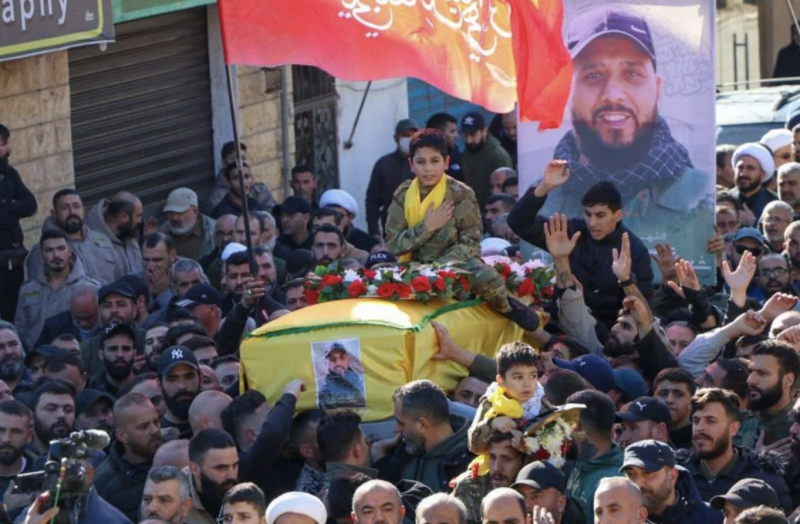
The funeral of a Hezbollah fighter killed in an Israeli strike in Mais al-Jabal , southern Lebanon, Dec. 26, 2023. (Credit: AFP)
“We are totally ready to commit to the implementation of international resolutions, provided that the Israeli side does the same.” On Friday, caretaker Prime Minister Najib Mikati expressed the Lebanese side’s openness to the implementation of UN Security Council Resolution 1701, which provides for Hezbollah’s withdrawal beyond the Litani River.
His remarks, which are all the more interesting given that Hezbollah is the main supporter of Mikati and his cabinet, come at a time when diplomatic efforts intensified to calm the situation in southern Lebanon. European and US efforts are being deployed to establish “long-term” stability in the border area. However, the nature and method of this stability remain unclear, in the absence of a clear international vision.
A number of ideas are circulating in diplomatic and political circles, and are being passed on to Lebanon. But most assume that concrete results can only be achieved when a ceasefire is introduced in Gaza.
An ‘achievement’ for Lebanon
One of the messages that Europeans and Americans conveyed to Lebanon is often reiterated: Israel changed after the Oct. 7 Hamas attack and can no longer accept what it used to. The inhabitants who left the northern towns will only return when the risk of an operation similar to that of al-Aqsa Flood has been eliminated from southern Lebanon.
The Israelis are counting on US efforts to find an agreement to demarcate the land border between the two countries and restore calm.
Citing concordant US, Lebanese and Israeli sources, the New York Times confirmed information that L’Orient-Le Jour had relayed: US Special Envoy Amos Hochstein has passed messages to officials of Lebanon, Hezbollah and Israel so as to strike a deal.
However, according to a Lebanese governmental source, Beirut is sticking to its position. It is affirming its commitment to Resolution 1701 on the condition that Israel ends itsviolations, stops bombing Syria from Lebanese airspace and demarcates its border with Lebanon.
“Israel must withdraw from the 13 disputed border points, including point B1, the north of the village of Ghajar, and the Shebaa farms,” said the above-mentioned source.
This would represent a significant achievement for Hezbollah, which would seem to have achieved a victory for Lebanon.
Western diplomatic sources reported that the Israelis are no longer confident about Resolution 1701, as they believe that Hezbollah has used it in promoting its influence, improving its military capabilities and carrying out attacks against the Israeli armed forces. This has created among some Israelis an opposition to the political process and negotiations, as they believe that any agreement could one day be violated.
War of attrition
While waiting for the negotiations to bear fruit, clashes between the two sides continue, with the risk of turning into a prolonged war of attrition. The Israelis are stepping up their military operations to improve their position in the negotiations, expanding the zone of hostilities in the south, both horizontally and vertically.
Over the last few days, they divided the zone into three parts: The first 10 km deep, the second between 10 and 20 km deep and the third between 20 and 40 km deep. In the first two zones, the Israelis are targeting Hezbollah positions, posts or “infrastructures” and even houses.
Moreover, the Israeli defense Minister and chief of staff claimed that they destroyed all of Hezbollah’s observation points in the first zone. Yet, Hezbollah proved the opposite last week by carrying out operations from points along the border.
The third zone, considered to be the third line of defense with important strategic reserves, is subject to periodic attacks, such as last week’s bombardment in Iqlim al-Tuffah, Jabal Rihane, Jabal Safi and Birkat Jabour.
Strikes against these targets recently intensified, with Israel inaugurating a third phase in the confrontation: Threatening to assassinate Hamas leaders in Lebanon, or even Hezbollah, and striking military sites or Hezbollah’s missile warehouses.
Recently, the Israelis have turned their attention to Hezbollah’s tunnels in southern Lebanon, seeking to locate and target them.
This article was originally published in L'Orient-Le Jour. Translated by Joelle El Khoury.